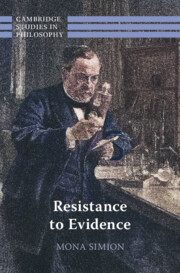Acknowledgements
I have benefitted from extraordinary levels of support from my peers and mentors for this research. I would like to especially thank Jessica Brown, Herman Cappelen, J. Adam Carter, Sandy Goldberg, Peter J. Graham, John Greco, Jonathan Jenkins-Ichikawa, Chris Kelp, Jennifer Lackey, Matt McGrath, Susanna Schellenberg, Ernie Sosa, and Tim Williamson for the feedback on this material and all the support. I would also like to thank Bob Beddor, Sven Bernecker, Cameron Boult, Fernando Broncano-Berrocal, Matthew Chrisman, Juan Comesaña, Paul Faulkner, Claire Field, Giada Fratantonio, Lizzie Fricker, Miranda Fricker, Jane Friedman, Mikkel Gerken, Olav Gjelsvic, Kathrin Gluer-Pagin, Emma Gordon, Patrick Greenough, Thomas Grundmann, Michael Hannon, Frank Hofmann, Matt Jope, Tim Kearl, Maria Lasonen-Aarnio, Clayton Littlejohn, Jack Lyons, Lilith Mace, Aidan McGlynn, Anne Meylan, Lisa Miracchi, Jesus Navarro, Gloria Origgi, Orestis Palermos, Carlotta Pavese, Richard Petigrew, Duncan Pritchard, Bernhard Salow, Susanna Siegel, Martin Smith, Amia Srinivasan, Julia Staffel, Rachel Sterken, Kurt Sylvan, Alessandra Tanesini, Joe Uscinski, Daniel Whiting, Asa Wikforss, and Christopher Willard-Kyle for the very helpful discussions. I am sure that I have missed people who deserve to be acknowledged by name and hope they will accept my apologies. Many thanks also to two anonymous referees for Cambridge University Press who gave me excellent comments on the book.
I would also like to thank the organisers and audiences of the Cambridge Moral Sciences Club, University of Cambridge; the Urbino Summer School in Epistemology; Philosophy Visiting Speaker Seminar, University of Aberdeen; Arche Epistemology Seminar, University of St Andrews; Bled Philosophical Conferences, Bled; Episteme Conferences, Negril; The Power and Limits of Rational Reflection Conference, University of Luxembourg; the British Society for Theory of Knowledge Meeting, Glasgow; Bad Beliefs, Conspiracy Theories, Testimony and Resistance to Evidence GAP11 Satellite Workshop, Berlin; Epistemic Explanations: Investigations into the Epistemology of Ernest Sosa, University of Miami; COGITO–LANCOG Workshop, University of Lisbon; the American Philosophical Association Pacific 2022 BSTK Session, Vancouver; The Social and Political Dimensions of Epistemic Risk Conference, University of Seville; Nicod Philosophy Colloquium, Institut Jean Nicod; Philosophy Colloquium, University of Warwick; Jowett Society, University of Oxford; European Epistemology Network Meeting 2022, Glasgow; Talk Series on Conspiracy Belief, University of Bochum; Young Academy of Europe; Colloquium in Theoretical Philosophy, University of Zurich; Book Symposium on Ernest Sosa’s ‘Epistemic Explanations’; 2021 APA Pacific Division Meeting, Portland; Arché Conceptual Engineering Seminar, University of St Andrews; Visiting Speaker Seminar, University of Stirling; the Asian Journal of Philosophy Launch Conference; ‘Climate Justice, Risk, and Wellbeing’ Conference, COP26 UK Universities Innovation Showcase, Glasgow; Thomas Grundmann Summer School, University of Cologne; Epistemic Normativity Workshop, University of Leeds; ALEF Workshop in Analytic Philosophy, Babeș-Bolyai University; Perception: Epistemology and Mind Workshop, University of Glasgow; Research Seminar, University of York; The 2019 Joint Session of the Aristotelian Society and the Mind Association, Durham University; Closure and Transmission Workshop, University of Edinburgh; Edinburgh Epistemology Graduate Conference, Edinburgh; Visiting Speaker Seminar Series, University of Reading; Philosophy Club, University of St Andrews; Philosophy Seminar, University of Southern Denmark. I got excellent feedback from these audiences over several years, and the view has thereby improved significantly.
A few chapters of the book draw on previously published work: Chapters 2 and 6 partially draw on my Young Epistemologist Prize-winning paper ‘Resistance to Evidence and the Duty to Believe’ (Philosophy and Phenomenological Research, 2023). Chapter 5 relies on my contribution to ‘Epistemic Virtues and Virtues with Epistemic Content’ (with C. Kelp, C. Boult, and J. Schnurr, in J. Greco and C. Kelp (eds.), Virtue Theoretic Epistemology: New Methods and Approaches, Reference Kelp2020) and on my 2023 Inquiry paper ‘Tanesini on Truth and Epistemic Vice’. Chapter 10 draws on my ‘Scepticism about Epistemic Dilemmas’ (in K. McCain, S. Stapleford, and M. Steup (eds.), Epistemic Dilemmas: New Arguments, New Angles, 2021). Chapter 11 relies to some extent on ‘Closure, Warrant Transmission, and Defeat’ (in M. Jope and D. Pritchard (eds.), Epistemic Closure and Transmission, 2022). Finally, Chapter 12 relies on my Episteme paper ‘Knowledge and Disinformation’ (Simion Reference Simion2023b). I want to thank the editors of these journals and volumes, as well as the anonymous referees, who provided me with excellent comments on these articles.
The research results outlined in this book have been made the subject of two major outreach initiatives; I want to thank all those involved in enabling me to showcase my results in these ways: (1) a 2022 White Paper titled ‘Trust, Disinformation, and Evidence Resistance’, written and submitted in response to the UK Parliament Call for Evidence: ‘Fighting Disinformation with Trustworthy Voices’ (with C. Kelp). The White Paper is published on the UK Parliament website (https://committees.parliament.uk/writtenevidence/111503/pdf/); (2) a 2022 documentary film titled Scotland, African Voices: The Covid19 Vaccine Debate (co-developed with Josephine Adekola, PI). The documentary aims to address health inequalities and save lives by encouraging vaccine take-up in the Scottish African, Caribbean, and Black community and by highlighting the social-epistemological obstacles amongst the barriers to vaccination for these communities. The full documentary is available here: https://youtu.be/h1yNAZffpOg. The trailer is available here: www.youtube.com/watch?v=9Ie8SMVvy1Y.
The research in this book has been very generously funded by a Horizon 2020 European Research Council (ERC) grant for my project ‘KnowledgeLab: Knowledge-First Social Epistemology’ (grant agreement no. 948356). I’m extremely grateful to the European taxpayers, the ERC team, as well as their pool of reviewers for this fantastic level of support.
Many thanks to Sandy Goldberg and Hilary Gaskin at Cambridge University Press for all the excellent advice, continuous support, and efficiency.
Finally, many thanks to my partner Chris Kelp, my kids Max and Mia Kelp, and my grandparents Georgeta and Iordache Diaconita for all the extraordinary support.



